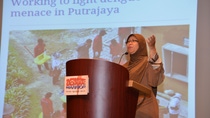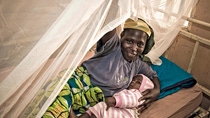Agriculture
Malaysia steps up Dengue battle
April 2014 - As dengue hotspots in Malaysia experienced a four-fold increase in infections compared with the same period the previous year, the Malaysian authorities stepped-up a nationwide campaign to control the mosquitoes that spread the virus.

In January 2014, the Malaysian Ministry of Health announced the deployment of BASF’s larvicide Abate® in an integrated campaign combining fogging, ULV spraying and larviciding, to control adult mosquitoes and treat potential breeding sites. Local councils and health officials are rotating Abate® with biological control agents to stop mosquito larvae developing in areas of standing water such as water containers, drains, garbage dumps and construction sites.
According to the World Health Organization, dengue fever may be infecting over 100 million people each year. It is a severe flu-like illness that is transmitted predominantly by day-biting Aedes mosquitoes. There are four serotypes of the dengue virus (DEN-1, DEN-2, DEN-3 and DEN-4). Recovery from infection by one provides lifelong immunity against that serotype. However, subsequent infections by other serotypes increase the risk of developing a potentially lethal form called severe dengue. There is no vaccine, so prevention focuses on mosquito control.
BASF spoke to Assoc. Prof. Dr. Hidayatulfathi Othman, University of Kebangsaan Malaysia, a leading expert on vector-borne diseases about the dengue situation in South East Asia.
BASF: Why is dengue on the rise at the moment in Malaysia and the Southeast Asia region?
Assoc. Prof. Dr. Hidayatulfathi Othman: In Malaysia, it’s due to the new version serotype DEN 1.1 that been circulating among the population. Moreover, the existing DEN 2 serotype is also becoming more virulent than ever. In Southeast Asia in general, several factors have combined to produce epidemiological conditions in developing countries in the tropics and subtropics that favor viral transmission by the main mosquito vectors, Aedes aegypti and Aedes albopictus. These include rapid population growth, rural-urban migration, inadequate basic urban infrastructure (e.g. unreliable water supply leading householders to store water in containers close to homes) and increase in volumes of solid waste, such as discarded plastic containers and other abandoned items which provide larval habitats in urban areas.
What other factors are affecting the spread of the disease?
Othman: Geographical expansion of the mosquito has been aided by international commercial trade particularly in used tires which easily accumulate rainwater. Increased air travel and breakdown of vector control measures have also contributed greatly to the global burden of dengue. Moreover, we are experiencing more erratic weather with ever wetter seasons and the dry season is becoming a drought season. During dry/drought season, people tend to keep water in containers and these unknowingly serve as breeding places for mosquitoes. These conditions allow the Aedes mosquito particularly to breed and thrive. Although great efforts and control measures have been taken by the government, additional action must come from the community, private sector, non-governmental organizations and industry as well. The rise of dengue needs to halted by collective efforts.

How can BASF support the fight against dengue?
Othman: BASF has decades of experience in producing insecticides that target adult mosquitoes and larval stages. Abate® is one of the most famous of them. It has been in the market for more than three decades and still going strong as the main solution for larval control. Even the Malaysian Ministry of Health is encouraging the public to help stop the spread of dengue by inspecting and eliminating possible mosquito breeding grounds and using larvicides such as Abate® 1SG.
How does BASF work in partnership to stop the spread of dengue?
Othman: BASF displays its commitment to Corporate Social Responsibility without hesitation and constantly supports and cooperates with the research institutions and local universities in finding the solutions for the fight against dengue fever. Particularly in Malaysia, BASF has earned a place in researchers’ minds when it comes to finding the right partner, as BASF always entertains the request. And vice versa, researchers are also ever ready to facilitate when it comes to responding to BASF requests. Personally, my plan with BASF now is to strengthen the collaboration that has been going on for the past 15 years by contributing my expertise and working hand in hand with BASF to combat dengue.
What other measures have been taken so far in the fight against dengue?
Othman: There is a list of control measures against dengue that has been published by the government but this really came to life after the recent Dengue Warrior educational seminar in Singapore. This seminar is one way of announcing and pleading the danger of this disease and informing key target groups i.e. contractors, builders and the general public on how to control the disease. Construction sites are the most notorious breeding sites for Aedes mosquito. They constantly provide the well hidden areas for the Aedes mosquito to breed and flourish. Targeting these audiences is crucial and the attendance at the Dengue Warrior seminar was extraordinary. Getting their cooperation is absolutely essential in controlling dengue, particularly in the urban areas.
Have you seen any significant results yet?
Othman: No, not yet. But I am very optimistic and hopeful. We have to constantly create awareness. I believe in big scale, repeated, intensive and constant communication. BASF has taken the first step; big scale information during the Dengue Warrior seminar. The other 3 steps need to be followed; repeat, intensify and communicate constantly.




.pdf/jcr:content.jpg)